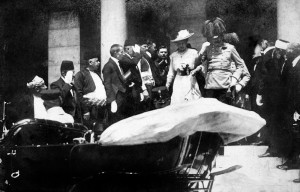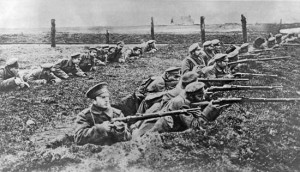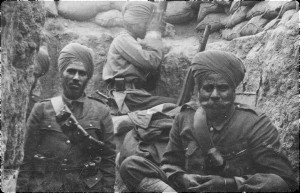
World War One
So often we hear and teach that World War One was truly a global war– but rarely do we move beyond the traditional European or Western narrative. Here, we have provided teaching resources that we hope will help teachers move beyond the Western narrative of the Great War.
Pre-WWI:
The Naradna Odbrana: a description of the program of the Serbian nationalist group Naradna Odbrana, of which Gavrila Principe was a member.
Anglo-Japanese Alliance: the main points of the Anglo-Japanese Alliance.
Assassination of Archduke Ferdinand: a firsthand account of the assassination by Borijove Jevtic, one of the leaders of Narodna Odbrana, who was arrested with Gavrilo Princip after the assassination.
Memoir of the Archduke’s Assassination: a firsthand account of the assassination by the archduke’s bodyguard Count Franz von Harrach.
The Blank Cheque: Germany pledges its unconditional support to Austria should it face a Russian attack, known as the Blank Cheque.
Austrian Ultimatum to Serbia: the ultimatum issued to Serbia after the archduke’s assassination, designed to be unacceptable.
Serbian Reponse to Austro-Hungarian Ultimatum: the Serbian government responds to the ultimatum, agreeing to almost all of the harsh conditions.
1914: War Begins
German Declaration of War on Russia: the formal declaration of war carried by the German ambassador to St. Petersburg on August 1 in response to Russian mobilization on July 30.
German Request for, and Belgian Denial of, Free Passage through Belgium: Germans request Belgian friendly neutrality and free passage through Belgium to France, claiming self-defence against France as their motive. The Belgian Foreign Minister responds by expressing the shock at this blatant violation of Belgian independence, and insists that Belgium is obliged to defend itself in order to preserve its national honour and fulfill its obligations to Europe.
The Germans Enter Brussels: an article from a German newspaper detailing the German entry into Belgium and praising the organization of the Germany army.
King Albert I to Parliament after Germans enter Belgium: a moving speech to the Belgian parliament by King Albert I after the Germans enter Brussels.
Sir Edward Grey’s Speech to Parliament: excerpts from Foreign Secretary Sir Edward Grey’s speech to parliament, committing to the protection of France and Belgium in the face of an attack, and debating the prospects of going to war. Later that evening, Grey received word of the German ultimatum to Belgium. Britain declared war on Germany the next day.
Daily Mirror- Declaration of War: an article from a British newspaper, the Daily Mirror, delivering news of the declaration of war against Germany.
Wilhelm II Account of start of the war: Kaiser Wilhelm II’s account of the start of the war, clearly intended to justify German actions.
Wilhem II War speeches – outbreak of war: two brief speeches given by the Kaiser from the balcony of the royal palace, rallying Germans together in the name of the Fatherland.
Trench Warfare Begins on the Aisne: an account of the gruelling trench warfare at the Battle of the Aisne by British Col. Edward D. Swinton, who expresses mild surprise that Germany is such “a formidable enemy.”
A Summary of the Battle of Tannenberg: a report by German General Paul von Hindenburg on his crushing victory at the Battle of Tannenberg, a tragic defeat for the Russians, whose commander committed suicide after realizing they were encircled by German troops.
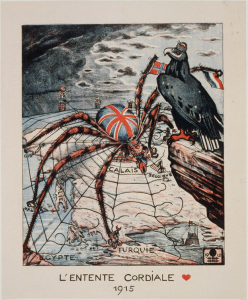
German war poster
1915:
21 Demands: these 21 demands were made to China in 1915 by Japan, which had used the war as an opportunity to grow its power and influence in the region. These changes were reversed during the 1921-1922 Washington Conference.
Wilson’s First Warning to the Germans: Woodrow Wilson warns the Germans that the US will not tolerate the sinking of neutral US ships.
The Use of Poison Gas: an article from the New York Tribune reporting on the first use of poison gas at Ypres.
The Treaty of London: the agreement between Italy and the Allies bringing Italy into the war. The significant con
cessions promised to Italy herein later caused problems during the Treaty of Versailles negotiations.
Reports on Gallipoli: reports on the battle at Gallipoli, of which Australian and New Zealand armies played a significant part.
Development of US Neutrality Policy: discussions on US neutrality between President Wilson and Secretaries Bryan and Lansing.
Propaganda Leaflets: propaganda leaflets dropped over enemy lines by plane or balloon.
German Reaction to Italian Declaration of War: the German Chancellor decries the Italian declaration of
war as a betrayal of Germany and of the Italian people, who supposedly did not want to go to war. British Government Report on the Armenian Massacres of April-December 1915: Lord Bryce from the British Government denounces the Armenian Massacres.
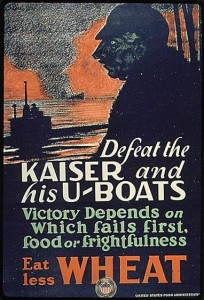
American anti-German poster.
1916:
Proclamation of the Irish Republic: the beginning of the the Easter Uprising.
Sykes-Picot Agreement: secret agreement between Britain and France dividing Ottoman territories in the Middle East into prospective spheres of influence.
Mexican Complaint against United States: a formal complaint written by Mexican President Venustiano Carranza after the US sent an armed expedition into Mexico.
US Response to Mexican Complaint: the US responds to the Mexican complaint and provides its rationale for its actions.
Communiqué from Townshend to Kut Garrison: Sir Charles Townsend’s communiqué to boost the morale of the troops who were under Turkish siege at Kut after an overly ambitious advance on Baghdad. The troops ultimately surrendered and the defeat took a humiliating toll on British influence in the region.
1917:
Zimmerman Telegram: the infamous German telegram proposing an alliance between Mexico, Germany, and Japan should Mexico be faced with American hostility. It is widely considered to be a partial factor in the United States’ entrance into WWI.
Japanese Response to Zimmerman Telegram: the Japanese Prime Minister insists that he had no knowledge that such an alliance was being proposed to Mexico.
Arthur Zimmerman on the Zimmerman Telegram: Arthur Zimmerman defends his telegram after news of the proposed alliance reaches the publuc.
Wilson’s Speech to Congress re- war with Germany: President Woodrow Wilson addresses the Congress on the subject of declaring war on Germany.
Cuba Enters the War: Cuba enters the war in solidarity with the United States.
Panama Enters the War: Panama enters the war in solidarity with the United States.
Lenin’s April Theses: Lenin’s writings proposing Soviet control of the state.
Guchkov on Civil Unrest in Russia: the Russian Minister of War warns that the fruits of the February Revolution are at risk of being lost in the midst of growing civil unrest.
Brazil Goes to War: an Atlantic trading nation under increasing threat from German submarine activity, Brazil revokes its position of neutrality and declares war on Germany.
British Report on the Fall of Jerusalem: the British report on the fall of Jerusalem, seen as an uplifting success in the face of so many defeats.
1918:
Wilson’s 14 Points: President Woodrow Wilson’s famous peace policy.
German Response to 14 Points: the German Chancellor’s response to Wilson’s 14 Points, which was generally one of acceptance.
Allied Appeal for US Forces: Britain, France, and Italy ask the United States to send more help, facing a strengthened German army.
Massey on Allenby’s Progress: a British observer reports on Sir Edmund Allenby’s progress in Jerusalem, which led to a quicker than expected capture of the city.
German High Command Recommends Peace: the German High Command proposes peace negotiations to the Reichstag.
Paul Von Hindenburg’s Call for Peace: after receiving the recommendation of peace from the German High Command, Paul Von Hindenburg calls for peace in order to prevent the waste of more lives.
Eyewitness Reports of the Armistice: a French and a British report of the armistice negotiations.
Kaiser Wilhelm II Abdication: three documents related to the forced abdication of Kaiser Wilhelm II in Germany.
Armistice Announced to Congress: President Wilson announces the armistice to the American Congress.
1919:
Allied Occupation of the Rhineland: a British reporter gives an account of the occupation of the Rhineland.
Account of the Opening of the Peace Conference: a British reporter records the opening of the Peace Conference in Paris.
President Ebert’s Opening Address: the opening statements of President Ebert, the first President after the abdication of the Kaiser.
Determination of War Guilt: the report placing full responsibility for the war on the Central Powers.
Germany Protests Peace Terms: Germany protests the harsh terms of the Peace Terms, calling them unjust.
Allied Reply to German Protest of Peace Terms: the Allies respond to Germany’s protests, claiming that Germany has failed to acknowledge the true nature of the Great War — the war was not merely a “struggle for territory and power” but “the greatest crime against humanity and the freedom of peoples that any nation, calling itself civilized, has ever consciously committed.”
Covenant of the League of Nations: the covenant to which all members of the League of Nations agreed in 1919, with some amendments made in 1924.
*Note: Many of the primary sources provided on this page can be found at The World War I Document Archive or at First World War: A Multimedia History of WWI. Check out their websites for even more WWI documents.
 Institute for World History
Institute for World History